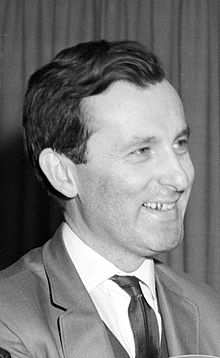Daniil Shafran
| Daniil Shafran | |
|---|---|
 |
|
| Background information | |
| Native name | Даниил Борисович Шафран |
| Birth name | Daniil Borisovich Shafran |
| Born | January 13, 1923 Petrograd, RSFSR |
| Died | February 7, 1997 (aged 74) |
| Occupation(s) | Cellist |
Daniil Borisovich Shafran (Russian: Даниил Борисович Шафран, January 13, 1923 – February 7, 1997) was a Soviet Russian cellist.
Daniil Shafran was born in Petrograd (later Leningrad, then Saint Petersburg) in 1923. Even from before his birth he was surrounded by music. His mother and father were music students when he was born. His father, Boris Shafran, went on to be principal cellist of the Leningrad Philharmonic Orchestra and his mother, Frida Moiseyevna, was a pianist. He recounted how, as his mother went into labour, his father was practicing passages from Haydn's D major Concerto in preparation for a recital, and was reluctant to go to the hospital until he had mastered a difficult technical passage.
Shafran was initially taught by his father, whom he had long begged for lessons. When aged eight and a half, "my father met me brandishing a small cello. 'I bought you a cello', he cried. 'Sit down and we'll start studying'". His father was a serious musician and strict teacher and after year and a half under his tutelage, Shafran had absorbed many of the values that he held throughout his life: diligent and regular practice and the importance of striving for the highest goals. A key principle established was to overcome technical obstacles by learning to play far beyond the demands of the work, and Shafran learned to be "mercilessly strict with myself when practicing".
When he was ten years old (other sources say eight), his father took him to Alexander Shtrimer (1888–1961), then professor at the Leningrad Conservatory, for lessons. Initially this was at the Conservatory Special Music School for Children, where Shtrimer also taught, and then at the Conservatory itself where Shafran was one of ten talented children chosen to attend. Shafran remained with Shtrimer for more than ten years (into his early twenties). Though his father took a more active interest in his progress than might be "correct in terms of pedagogical ethics", he took no other teacher, commenting that "my own experiences and my association with my musician colleagues were all a 'second teacher' to me".
Shafran's first public performance was at the age of 10, at one of the Conservatory concerts, where he played two technically demanding works by David Popper: 'Spinning Song' and 'Elfentanz'. His orchestral debut was a year later, when 11, when he played Tchaikovsky's Rococo Variations with the Leningrad Philharmonic Orchestra under the visiting British conductor, Albert Coates.
...
Wikipedia
